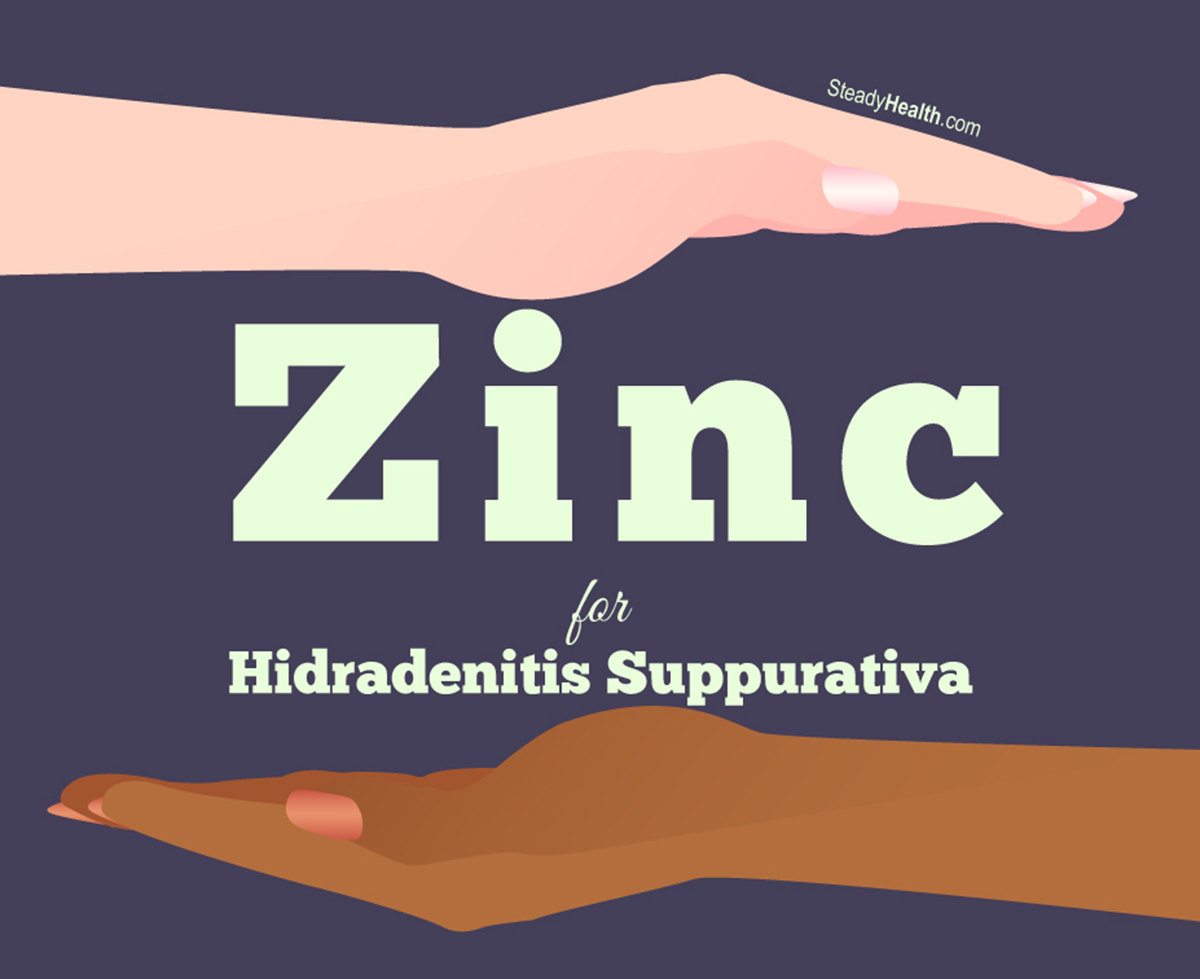Patients who suffer from hidradenitis suppurativa have a lot to deal with — painful lumps, abscesses, blackheads, pustules, and cysts in areas prone to sweating like the armpits and groin, but also scar formation and the knowledge that whatever they do to try to alleviate their chronic skin condition, the relief will only be temporary in most cases.
Even the most definitive hidradenitis suppurativa treatment options like hidradenitis suppurativa treatment with lasers or surgery will only provide temporary relief from painful symptoms, and most skin lesions will return in just a few months.
Hidradenitis suppurativa patients can try to take treatment into their own hand, exploring a whole cascade of natural treatments for hidradenitis suppurativa that can dampen the frequency of flare-ups of these pain episodes. One natural hidradenitis suppurativa remedy that could actually be beneficial would be using zinc for these skin ulcers.

Why would zinc help you tackle your skin problems?
You have probably been using zinc to improve the condition of your skin already, whether or not you have hidradenitis suppurativa and whether or not you are aware of it. That's because modern, commercially-produced, soaps and shampoos typically have small amounts of zinc added to the final fluid as a potential solution for dandruff and other skin conditions that are quite prevalent in the general population [1].
Zinc is considered to be an essential element in our bodies because it is needed in hundreds of biochemical reactions. Some of the most obvious first signs of a zinc deficiency would be the appearance of skin rashes [2]. Chronic conditions like gastrointestinal diseases or alcohol dependence can predispose patients to suffer from zinc deficiencies even more.
Populations that are at risk for zinc deficiencies coincidentally are pediatric patients, the same age group that hidradenitis suppurativa is likely to be first found as children approach puberty. In population studies, it was determined that the rate of zinc deficiencies could be as high as 20 percent in developing countries, but rates in Western cultures often drop to as low as 10 percent [3].
In balanced diets, it will be quite easy to get the daily recommended values of zinc you will require daily without even necessarily aiming for it, but if you are a picky eater (like many children are), there is a good chance that appeasing a child's palate may be robbing him or her of essential zinc inadvertently.
Some foods that are extremely high in zinc would be oysters, lean beef, ground beef, turkey and peanuts [4]. If you can already envision a struggle trying to get your child to eat any of these foods, zinc supplementation with tablets may be a more fruitful venture for you.
Will zinc supplements improve my hidradenitis suppurativa symptoms?
Not only do zinc deficiencies cause skin conditions, studies also show that zinc has a therapeutic role in numerous dermatological conditions, from acne to diaper rash, and from pellagra to atopic dermatitis. Zinc also plays a role in hidradenitis suppurativa treatment.
As it currently stands, most dermatological manifestations will be treated with either oral or topical zinc preparations to mute or alleviate the symptoms. Conditions like warts, acne, rashes, psoriasis, and rosacea are just a few of the many conditions where zinc is considered to be a staple treatment in clinical practice — and if you happen to be affected by any of these, you now also have something interesting to look into. [5]
When focusing on zinc for hidradenitis suppurativa more specifically, studies show that the anti-oxidant and anti-inflammatory properties of zinc were able to help reduce the pustules seen in hidradenitis suppurativa in all 22 patients taking 90 milligrams of zinc gluconate daily [6].
In this pilot study, all patients had already been prescribed potent anti-acne medications like isotretinoin or anti-androgens, or had surgery to deal with relapses of hidradenitis suppurativa. The investigation revealed that eight patients achieved complete remission of their symptoms, while 14 had partial remission. This supplement was well-tolerated and only 4 of the 22 patients complained of gastrointestinal distress. [6]
This is a promising result, but there are a number of limitations that make it hard to believe that zinc is typically as effective as "advertised" in this study.
Firstly, this was a pilot study done on a small number of patients, so it is hard to conclude if zinc would be as effective when used on a larger population. Secondly, this study was also conducted on patients who had underlying Hurler Syndrome, a common co-morbidity of hidradenitis suppurativa. Patients without the this underlying metabolic disease were not studied so it is hard to stay that zinc would help or be ineffective in a more typical hidradenitis suppurativa patient.
Considering the near-universal use of zinc products in other dermatological conditions and the few side effects that are possible, it would not be a bad idea to ask your dermatologist if zinc is an appropriate natural treatment for hidradenitis suppurativa that you could try out. The worst that can happen is that is will lead to a relapse like most other hidradenitis suppurativa treatments so there is no harm in trying.
- Photo courtesy of SteadyHealth.com

